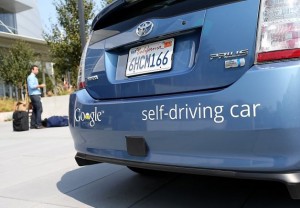Self-driving cars? Seems like a million miles off, right? Like flying cars (which already exist, by the way).
When Sebastian Thrun was 18, he lost his best friend in a car accident. Since then, he has set himself the goal of saving the 1 million people per year who die in car accidents caused by human error.
Thrun became one of the world’s most respected scientists working in the field of Artificial Intelligence and Robotics. As one of the founders of the Google X Lab, he was able, about a year ago, to test Google’s self-driving car with a blind man at the wheel (watch the incredible video here).
More recently, The Oxford Robot Car Project was reported doing similar tests in the UK. BMW and Audi have been working on prototypes and the technology is already legal in some US States. Some commentators think that self-driving cars will be commonplace on our roads within 15 years.
That may seem pretty surprising, but you may just be thinking “OK, that’s cool, I’ll just get a self-driving car then” or “No way – I love to drive! And what will happen to ‘Top Gear’?!”
We think a lot about disruption at TomorrowToday. And the one thing we usually find is that the disruption is not always the one that would be expected – indeed, this is what makes it so difficult for businesses to prepare for change and keep their competitive edge. And what’s really interesting about this particular development is how many ripple effects will be felt, over so many industries and sectors, when self-driving cars hit our roads.
On the most positive side, the World Health Organisation estimates that there are currently 1.2 million road traffic accidents worldwide, 90% of which are caused by human error. So potentially over 1 million lives could be saved by the removal of this error (although I think we’d have to assume that the technology may misfire from time to time). Also, we’d spend less time in cars because the traffic would move more efficiently, with fewer hold ups and traffic jams. And whilst we’re actually in the car, we wouldn’t be driving, so we could do other stuff! In the US alone, it’s been estimated that 4.8 billion hours are wasted in traffic congestion – we’d get all that back plus the time spent travelling congestion-free.
Of course, we wouldn’t really have to own cars, because we could just summon one to our house (or wherever) when we needed it, saving us a fair amount of money plus a lot of bother of learning to drive.
So far, so good, right? We will be safer, have more time and be financially better off.
Unless of course you work in the car industry (cars won’t be changed much and will cease to be any kind of a status symbol). Or you’re a mechanic (no accidents). Or a personal injury lawyer (ditto). What if you work in local or central Government – you’ll have to replace parking and speeding fines with another form of income. Energy companies will find their revenues reduced as road lighting is no longer required. And what will happen to railways? What will be the point?
If you’re interested to read more on this, Forbes has a great series of articles, which starts here.
One thing is for sure – there will be even more impacts that no-one has even thought of yet. Unless you have? In which case we’d love to hear them!




The road network is a huge existing infrastructure that is enormously inefficient. Due to personal driving traits, vehicle sizes and ‘domino’ effect (as well as peak & trough useage) the actual utilisation of square meters is less than 10%
If all vehicles self graded themselves by size and lane, all were driven safely with a minimum distance between and all drove at the same speed, the utilisation would proportionally increase. If utilisation is raised to even 50% let alone a theoretical 90%+, there would be more than sufficient expansion to accommodate all moving requirements by road. Therefore as you quite rightly point out, rail freight and air freight may well be come a thing of the past or be utilised in a different way. Couple this with electric vehicles and self charging stations, self parking and lights-off, curtains closed driving, and the whole commuting experience is less frenetic, dangerous and costly.
By saving 1 million lives per year, how does this affect population growth, we are already speeding towards 8 billion?